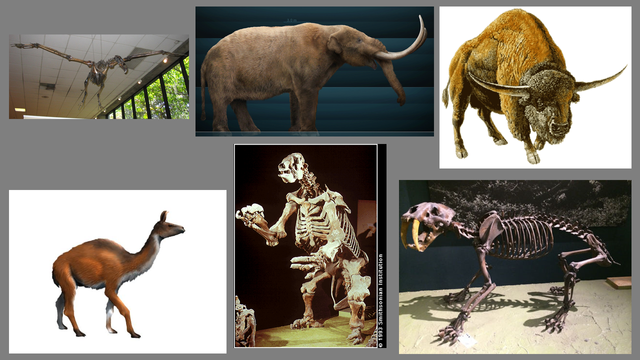
The Pleistocene Epoch
Time Frame
Geologists refer to the Pleistocene as an epoch starting around 2.6 million years ago (MYA) and lasting until about 10,000 years ago.

Similarities to Today
According to geologists, during this time continents were essentially in their modern locations and the climate has been described as mimicking El Nino weather.
Pleistocene biotas were extremely close to modern ones — many genera and even species of Pleistocene conifers, mosses, flowering plants, insects, mollusks, birds, mammals, and others survive to this day. UCMP
In fact, the avocado (one of my favorite foods!) is one such plant. The avocado seed was transported by megafauna in the Pleistocene, and survived because humans like me loved it so much.
Differences from Today
One of the main differences from the Pleistocene to now is the megafauna. Besides the iconic mammoths, there were, in the picture below from the top center clockwise: mastodons, longhorned bison, saber-toothed cats, giant ground sloths, native horses and camels in North America, and great teratorn birds with 25-foot wingspans.

Last Glacial Maximum
The Pleistocene saw great sheets of ice advance and retreat across Europe and North America, but left Siberia relatively unscathed to support immense grasslands.

In the Pleistocene Park Series:
Check out Part 2 about other large mammals already introduced to Pleistocene Park here!
Check out Part 3 about the Siberian/Amur Tiger here!
Check out Part 4 about the Mammoth Tundra-Steppe Ecosystem here!
Part 6 about the Mammoth Extinction Event coming soon!
This is based on a piece of creative nonfiction I wrote 9 years ago. I'm sort of testing ideas for children's books, so if you have any input on my writing or formatting, please let me know.
All images are original unless credited here:
- Woolly Mammoth Reconstruction: Encyclopaedia Britannica Kids
- Megafauna of the Pleistocene: Mastodon, Longhorn Bison, Saber-tooth Tiger, Giant Ground Sloth, North American Camel, Teratorn Bird.
- Last Glacial Maximum: Wikipedia